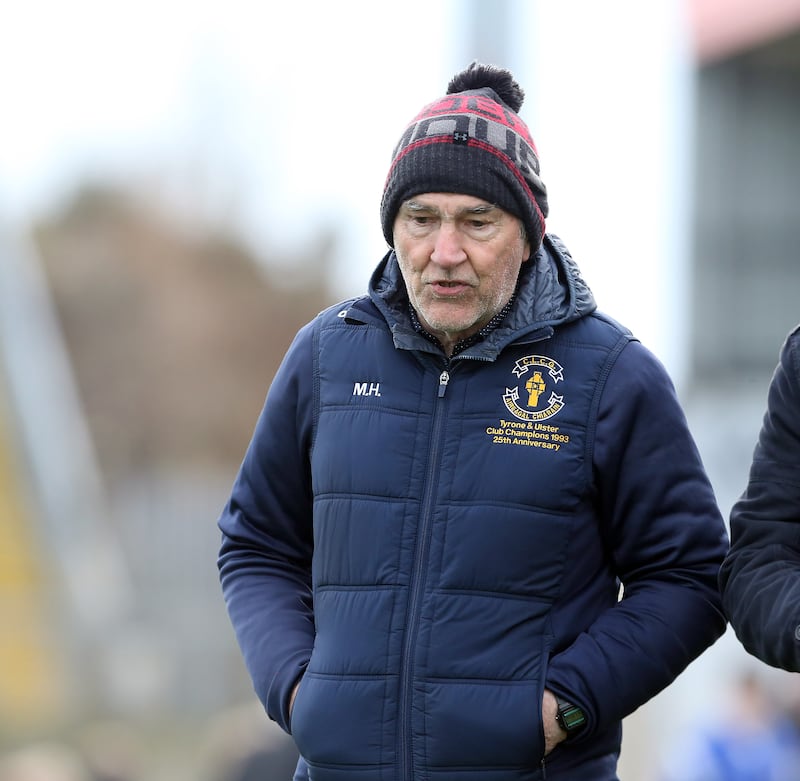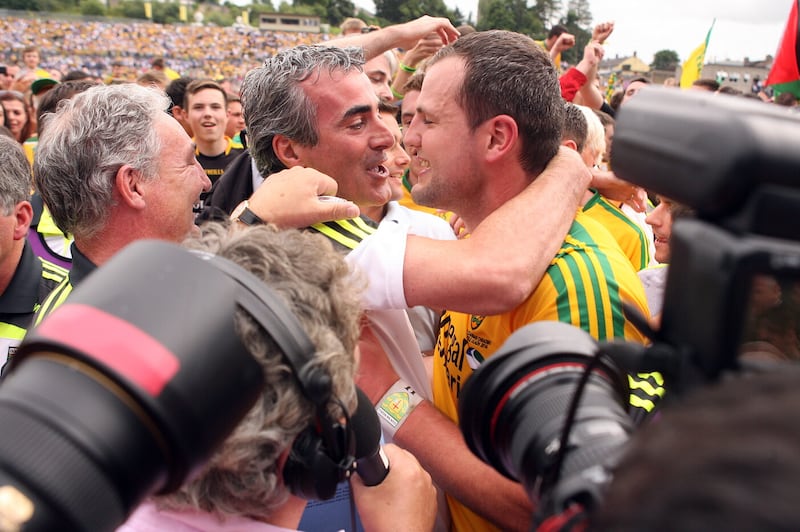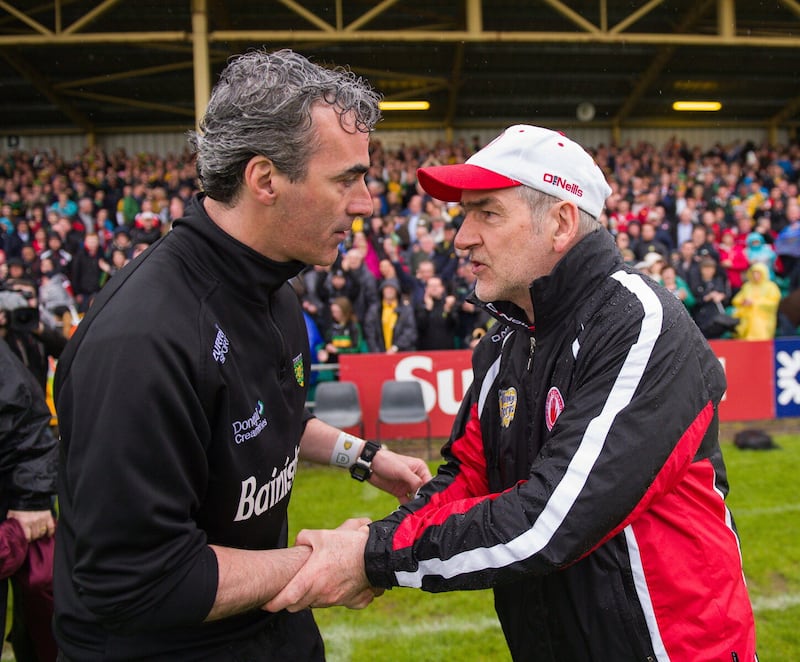AROUND the breakfast table, the five McGuinness children would sing along to an old LP of Makem and Clancy on their father’s stereo in the kitchen.
The words of The Two-Hundred-Year-Old Alcoholic were a routine of morning mischief that their mother turned a blind eye to, content that their innocence knew no better than to just repeat the lyrics.
Jim was born in November 1972, the youngest behind Noreen, Frank, Charles and Mark.
The family had a café in the middle of the Glenties and ran buses in the summer for the German cycling tourists that frequented the place.
Jim snr never played football. The youngsters dug their own sporting path.
“This was 1970s Ireland, when youngsters actually walked to school,” he said in his memoir, Until Victory Always.
1970s Ireland looked different to Mickey Harte.
He turned 18 a month before McGuinness was born.
In 1974, he left the calm of Ballymcilroy and stepped into the raging inferno of Belfast at the height of the Troubles.
Living just off the Falls Road, he enrolled in St Joseph’s teacher training college, now St Mary’s.
There he came under the wing of Jim McKeever, the star of Derry’s first All-Ireland final team in 1958 and one of his first great footballing influences.
The Harte house, where Mickey was the youngest of ten children, was always a football house.
He especially looked up to his elder brother Pete, travelling everywhere with him when Pete played for Tyrone in the ‘60s.
Francie’s son Davy (2005 and 2008) and Barney’s Peter (2021), the current Tyrone captain, have both won All-Irelands on the field.
The closest Mickey Harte came to winning an Ulster title as a player was in 1980.
They expected so little of themselves that he had gone along with booking a two-week camping holiday in France the fortnight before the final.
On the Friday, the boat home from Cherbourg to Rosslare was cancelled.
They drove three hours north to Dieppe, sailed to Holyhead, drove from there to London and then flew back in a panic on the Saturday evening.
Armagh beat Tyrone by 4-10 to 0-7.
Two years later the split happened in St Ciaran’s Ballygawley, leaving him and the rest of the Glencull men with no club to play with for almost a decade.
He missed out on the 1984 Ulster title and was still only 32 when his peers reached a first All-Ireland final in ‘86.
“I was heading into my thirties by then, but my competitive streak hadn’t aged. If I had still been playing club football, maybe I could have made it,” he recalled in his second book, Presence Is The Only Thing.
~~~~~~~~~~~~~~~
CHARLES McGuinness died in April 1985. It was the first of two major tragedies to befall the McGuinness household.
Jim had looked up to him just the way Mickey Harte did to his elder siblings. “He had a beautiful manner about him and the looks to match. He was a brilliant athlete, a natural.”
The litany of tragedies that befell Mickey Harte’s time with Tyrone began when he was in his third year as minor manager.
They were down to face a strongly fancied Donegal in the 1993 Ulster semi-final.
Arthur Mallon from Edendork, after whom the club’s grounds are named, had been with the squad that year but got injured and wasn’t involved with them for the game.
The morning of the game, word came through that Arthur had been killed in a car accident the previous night. He was one of seven people killed on Irish roads that weekend.
It was the first time Mickey Harte and Jim McGuinness shared a pitch.
Tyrone beat Donegal in the minor game in Breffni Park.
As the rest of the 20,000 crowd filtered in for the senior tie, McGuinness lined out in the Donegal number 10 shirt for their clash with Armagh.
They were two minutes from losing their Ulster and All-Ireland titles there and then. Two points down and a man down, debutant John Duffy snatched a draw.
The replay was comfortable and so the two men were back on the same pitch again, this time Clones.
Rain teemed from the heavens. A brand-new pitch had just been laid. The water wasn’t getting away, leaving puddles on top of the ground. It was chaotic.
Mickey’s minors beat Derry. His maiden Ulster title.
Jim and Donegal surrendered their crowns to the neighbours that would end up wearing them both.
~~~~~~~~~~~~~~~
FIVE years and one day later, on July 19 1998, both men were back in St Tiernach’s Park on Ulster final day.
Tyrone eased to a second straight minor title against Antrim on their path back to Croke Park and an All-Ireland success that would propel Harte’s managerial career.
With McGuinness promoted to midfield duties, the Anglo Celt Cup looked destined to return to the Hills until Geoffrey McGonagle leant his arse into Noel McGinley and turned Joe Brolly into a kissogram.
It was one of four finals he’d lose as a player, never winning one on the field having been a sub in ‘92.
The gap between that and their next Ulster title would grow to 19 years, until he had retired and was their manager.
A fortnight after the ‘98 Ulster final, his brother Mark was driving Jim to the airport in Dublin where he was due to board a flight to New York for the summer.
Just outside Lisnaskea, a lorry lost control and collided with their car, killing Mark.
For the second time in his relatively young life, Jim McGuinness had to cope with the loss of a sibling.
“In a way, my life revolves around that Ulster final,” he said in his book.
In their 1997 campaign, Tyrone endured the grief of the loss of first their team-mate Paul McGirr following an accidental collision during their game with Armagh.
Kevin Hughes then lost his brother Paul in a car accident in between the All-Ireland semi-final draw and replay with Kerry.
They lost the final to Laois that year but twelve months later went back and won in Croke Park against the same opposition.
Harte would quickly graduate to the U21s with that team and win the All-Ireland not once, but twice.
~~~~~~~~~~~~~~~
WHEN Errigal Ciaran won their second Ulster Club title in 2002, Harte was their leader and just about to become Tyrone’s.
He was 36 by the time the club had won their first county title in ‘93, reduced to a bit-part role on an emerging senior team that had finally healed its infamous split on the back of one Peter Canavan.
But Harte still cherished the medals won under Danny Ball.
He was manager himself in 2002.
They remain the only Tyrone club to have won Ulster.

When they faced Donegal champions Kilcar in the semi-final replay that first year, the Monday morning headline in The Irish Press screamed: ‘Errigal Wins But Football Is Lost’.
In a good old-style Irvinestown mudbath, the game finished 0-5 to 0-3.
The referee awarded 62 frees and sent three men off.
Not that it felt that way on the inside. Canavan once described it as “a brilliant game to play in”.
Harte has spoken about watching the video of that Kilcar game and the final against Downpatrick at home.
“I see [his brother] Peter with a mop of hair, men hanging out of him, going to ground and bouncing back up to turn the other way…” he once wrote.
Kilcar were an eternal bee in the bonnet of Jim McGuinness and Naomh Conaill.
He grew up watching their blue and gold ribbons hang from the Dr Maguire Cup, or the green and gold of Ardara, the red and white of Killybegs.
But never their own blue and white.
The old Glenties club had been an intermediate club for most of their history, featuring in just four senior finals, the last of them in 1965.
That finally changed in 2005.
McGuinness’ playing career with Donegal ended that summer, a week before they were due to play Antrim in Ulster.
He togged out for the club and came on at half-time when he wasn’t supposed to.
John Bán Gallagher, his midfield partner with Donegal and father of Eoghan, collided with him and McGuinness snapped his leg at the knee joint, tearing both cruciate ligaments.
He took over coaching the team with Hughie and John Molloy. They reached the Donegal final, where they would meet St Eunan’s.
Just four months after his operation, McGuinness got a promise from Hughie Molloy that if the game was won, he’d let him on at the end.
With three minutes remaining and Naomh Conaill leading by six points, Hughie made good.
Nineteen years later, they’re still operating off the same blueprint.
They’ve won seven Donegal titles, including four of the last five, and have overtaken Ardara and Killybegs and Kilcar on the roll of honour,.
Everyone else is sick of their ribbons now.
~~~~~~~~~~~~~~~
THE noughties were Tyrone and Harte’s.
No matter what argument Kerry throw, it was the Ulster men who showed up when the two sides went head-to-head.
Three All-Irelands in five years and four Ulster titles out of eight from 2003 until 2010 would once have been an unthinkable haul.
They were called pukey and defensive and nouveau riche but it all just rebounded back off a spiky exterior.
Before he got the senior gig, Harte won that Ulster Club title and Tyrone’s second successive All-Ireland U21 crown.
In the second of those campaigns, foot-and-mouth was first detected in the county in March 2001.
The outbreak began in Ardboe.
The Ulster final against Fermanagh was called off the morning of the game.
Tyrone were asked to step aside and let Fermanagh play in the All-Ireland series. Harte fought it.
He won the boardroom fight and a full seven months later, they won the field fight.
Mickey Harte was quickly installed as the new Tyrone senior manager.
Amid the acrimony of Eugene McKenna being made reapply when his joint-manager Art McRory stepped back over health issues, one of the other men in the frame was Brian McIver.
His patch was Ardboe, although he’d become almost synonymous with neighbours Ballinderry.
Brian McIver didn’t get the Tyrone job.
Four years later, he was named Donegal manager.
In his second year, 2007, the county won their first ever Division One league title.
The draw for Ulster left Tyrone in their sights for a semi-final. But when the day arrived, the league champions were blown away, beaten 2-15 to 1-7.
McIver stepped down at the end of 2009. McGuinness had applied for the job in the middle of his term. He went back for a second go.
Donegal gave the gig to John Joe Doherty and threw Jim the piecemeal of the U21s.
They hadn’t won a provincial title at the grade in 15 years.
That wait was quickly ended.
~~~~~~~~~~~~~~~
JIM McGuinness wasn’t sure where life was headed at 22.
He’d got a job with Eircom off the back of Donegal’s success. He had no Leaving Cert and no idea what he wanted to be. Jordanstown rejected his application.
Then he got a call to say Tralee IT were offering scholarships. That was the beginning of the rest of his life.
He studied Sports Science there, winning his first two Sigerson Cups, and went on to do a Masters in Liverpool John Moore’s before Jordanstown took him on and he won another Sigerson.
Mickey Harte qualified as a teacher but added a few bits on, taking an Open University degree in the mid-80s and then a post-grad in computer studies in Portadown Tech when he was living and teaching in Kircubbin on the edge of Strangford Lough.
Almost forty years later, long since retired from St Ciaran’s Ballygawley, his first game in charge of Derry was in Tralee.
Six days after Glen had won the All-Ireland club title, their trio of starters were aboard the bus.
Derry won by a point.
Jim McGuinness’ first challenge game in charge of Donegal U21s coincided with a confirmation in the Murphy household.
Michael asked to be excused. As captain, he was told he had to be there.
So he got his father to drive him down, arriving into the changing room in Ballyshannon wearing his suit.
Both such statements of intent.

~~~~~~~~~~~~~~~
McGUINNESS’S first competitive match as Donegal manager was supposed to be against Tyrone in the McKenna Cup.
But the first weekend’s fare of January 2011 was postponed as the Hartes and the entire world around them tried to come to terms with the cruel murder of their daughter Michaela while on honeymoon in Mauritius with her new husband John McAreavey.
When the game was played a few weeks later, the two teams stood together in silence beneath a suitably black and mournful sky that sat over Edendork.
“It is probably the only time in my life I didn’t really care if we won or not,” wrote McGuinness in his Irish Times column last year in the week that Harte’s Louth played in just their second Leinster final since 1960.
It was in Louth that McGuinness dipped his toe back into Gaelic football.
Following stints with Beijing Guoan and Charlotte Independence in soccer, he helped Fergal Reel’s Naomh Mairtín side win a first ever county title in 2020.
Six weeks later, Mickey Harte sat in the car park at Garvaghey with Mattie Donnelly watching the officers file out one-by-one until the last one flicked off the lights and got into his car. He knew it was done.
On November 13, The Irish News broke the news that after 18 years, he was stepping down as Tyrone manager.
Fourteen days later, Louth confirmed he was their new boss, bringing Gavin Devlin with him.
The first part of Harte’s reign had all been about Armagh.
Gaelic football grew bigger shoulders than it had ever had off that rivalry.
The second stanza was written around Donegal and Dublin.
When McGuinness took over Donegal, he famously used Tyrone jerseys in training.
As Michael Murphy stripped Ciaran Gourley of the ball and fed Brick Molloy through in the dying embers, the balance of Ulster football tipped and a new rivalry emerged.
In his most recent book, Devotions, Harte unveiled the true depth of his feelings at not having won that day.
“Their rise happened on our watch and we had so many opportunities to stop it that day in Clones. 2011 tilted the balance for Donegal though I still think we could have gone all the way that year…The regret for me is knowing their All-Ireland could have been ours.”
Tyrone would lose to them again in 2012 and then 2013. Narrowly both times, but beaten still.
He never got his fourth All-Ireland with Tyrone. Now he seeks it with Derry.
~~~~~~~~~~~~~~~
MICKEY Harte turned 69 last October, eighteen years older than Jim McGuinness.
Once, on his birthday, the Donegal man played in a league game against Armagh in Lurgan that descended into all-out war on the pitch.
When it settled down and the teams came in from the saturated pitch, they discovered they’d have to share the same shower room.
“Next thing you had twenty naked men squaring up to each other and trying to act with a bit of bravado. It was all, as one of our boys remarked after order had been restored, ‘a bit f***ing weird’,” his book recalled.
No weirder than the initial sightings of Mickey Harte in a Derry half-zip and hat.
Here the pair of them are, back on the starting line again.
Mickey Harte’s reigning back-to-back Ulster champions against Jim McGuinness’s Division Two winners, these potential upstarts whose previous summer was no real indication of who or what they are.
2011, meet 2024.
For all their differences, they have always been one and the same.


